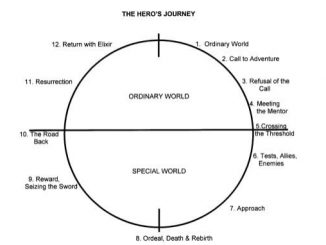
Although I have no experience of being a teacher, if there’s one thing that I do know, it’s enjoying a good engaging story, especially when there is a lesson to be learned from the events within the story. Stories have been used throughout human history to provide more than just entertainment, they also help to transmit information, share histories and teach important lessons, all while immersing the audience within the world being portrayed in the story.
As Sherrelle Walker explains, this is due to our brains being structured in a way that causes us to seek out coherent narrative structure in the stories that we hear and tell, then using this structure to absorb any information within the story and then connect it with any of our own personal experiences.(Juliani, 2014)
This is especially true with children with the Writer’s Bureau (2009) and the British Council with the BBC (2016) highlighting some of the benefits of telling stories throughout their growth which include;
- Increased confidence, self-esteem and understanding of empathy.
- Improved listening skills and verbal proficiency.
- Learning about various concepts like shapes, colours and objects.
- Learning about tasks and activities such as taking care of animals or preparing a meal.
- Discovering diverse cultures and people from around the world.
- Understanding emotions and how to cope with certain feelings.
- Offering a method of relaxation by enjoying stories during their downtime.
- Improving the development of their imagination.
Although there are many benefits to utilising stories within education, there are several challenges that come with the territory. Most of these challenges come from the stories that you’re hoping to use, the implementation of the story and its relevance to the subject being taught.
Mcnett provides a useful table of learning objectives that can be referred to in order to test the viability of a story that is intended to be used within an educational setting. They also point out that a story that doesn’t accomplish any of the objectives in the table doesn’t necessarily rule out the story being beneficial to the situation it’s used in, rather it runs the risk of being considered irrelevant to the current situation and a waste of time.

Although it is important to find stories that are relevant to subject matter that you’re hoping to tackle, if you don’t present the story in a way that captivates the audience and makes them want to listen, then you’re just wasting time and you might as well just hand your listeners a textbook about the subject they’re being taught.
Luckily you don’t need to be an actor to tell a convincing story and the British Council has a handful of techniques and skills that can be practised in order to improve your approach of storytelling, such as;
- Adapting the story in your own way
- Rehearse the story so that it feels natural when telling it.
- Vary the volume, pitch and tempo of your voice to exaggerate expression and to differentiate between you narrating and playing a character.
- Utilise body language, including your hands and face.
- Engage with the audience through eye-contact and looking at your audience as you speak.
- Utilise silence and pauses for dramatic effect where necessary.
- Remember to pace yourself to match the mood of the story.
(British Council and BBC, 2016)
This is only really scratching the surface of using stories as a teaching tool but hopefully this serves as a decent start to anyone who may be interested in learning more about a way of teaching that has been a long-standing yet effective method throughout human history.
References and further reading:
British Council and BBC (2016) Storytelling – benefits and tips | TeachingEnglish | British Council | BBC. Available at: https://www.teachingenglish.org.uk/article/storytelling-benefits-tips (Accessed: 19 June 2020).
Juliani, A. J. (2014) The Hidden Importance of Teaching With Stories – A.J. JULIANI. Available at: http://ajjuliani.com/hidden-importance-teaching-stories/ (Accessed: 19 June 2020).
Malamed, C. (2011) Why You Need To Use Storytelling For Learning, The eLearning Coach. Available at: http://theelearningcoach.com/elearning2-0/why-you-need-to-use-storytelling-for-learning/ (Accessed: 19 June 2020).
Mcnett, G. (2016) ‘College Teaching Using Stories to Facilitate Learning Using Stories to Facilitate Learning’. doi: 10.1080/87567555.2016.1189389.
Why are stories important for children? (2009) The Writers Bureau. Available at: https://www.writersbureau.com/writing/Why-are-stories-important-for-children.htm (Accessed: 19 June 2020).
- Observing how games teach players to think and plan ahead - 12th March 2021
- Learning about systems using games. - 15th January 2021
- Focus on… Wargaming and Wargames - 8th November 2020





Great tips on how to utlise story effectively. Thanks also for sharing the resources about teaching with stories. These will be really useful.